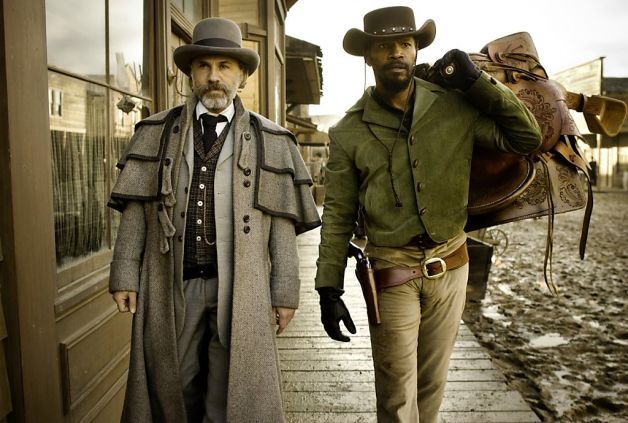
Quentin Tarantino's cameos in his own films are like signposts along the paths he's forged, their narrative and thematic functionality frequently overlooked amidst quips about his performance skills, excessive language, etc. His brief third act turn in Django Unchained might be his most obviously symbolic yet, a microcosmic reflection of a work that suggests someone brave or foolish enough (or both) to charge into a hellfire with dynamite strapped to their back. The absence of longtime editor Sally Menke is felt in this film's untamed sprawl and reinforced by a permeating melancholy; despite the anachronistic energy, cartoonish flourishes and brazen subversion of institutionalized dehumanization ("You want I should treat 'em like white folk?" "No, not like white folk."), this strikes me above all as a remarkably sad, boldly confessional picture, all the more remarkable for Quentin's restraint amidst material easily pushed over the line of taste. Jamie Foxx's titular slave-turned-bounty hunter rages (with glorious crimson strokes) against his captors but the scars (of whips, brands, and friends lost) remain, rendering his triumphs against the pre-Civil War establishment dubious at best. Impulsive choices (dialogue, in particular, feels less hyperbolic here than we've come to expect from this most conscious of writers) feel both mythic and lived-in, the film's relative imperfections complicating the knotty emotions of someone fully aware of their own creative and social privileges as a historical outsider. The trade-off is for something even greater than the sum of its parts, and what could in hindsight prove the most important contribution of an artist equal parts heralded and misunderstood.
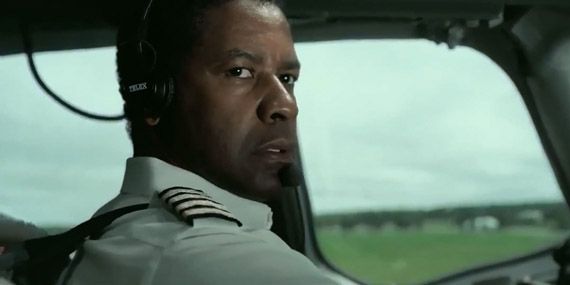
A thousand thank yous to Robert Zemeckis for showcasing a most terrifying (near) mass death sequence without a shred of the pornographic destruction or contempt of life that routinely infects the supposed entertainments of the multiplex, but one would be foolish to expect anything less from one of our great humanitarian mainstream artists. The first live-action film Zemeckis has helmed in the twelve years since Cast Away, Flight suggests the finely tuned studio work of Frank Capra or Jack Arnold, the material both blatant yet deep (the film's stairway conversation is a miniature masterpiece), the narrative structurally obvious on the page but raw and pulsating on the screen. A fortuitous convergence of events sees alcoholic/drug addicted vet pilot Whip Whitaker (Denzel Washington, alternately buried and on air, and leviathan at both) saving the doomed passengers of a malfunctioning jet, minus six, his lucid state the likely reason for his collected defiance of certain death, yet a professional and personal offense now inevitably confronted. What follows is a character drama fueled by devastating introspection: into addiction, into ego, into fear of death and life. Certain elements of this film hit close enough to home that I should confess a likely bias (the couple sitting nearest to me at a packed screening seemed disturbed by my persistent weeping), but we and our loved ones all must go sooner or later, and Flight's much-criticized turning point seems to me both natural and earned, for how else can we judge ourselves than by how we live up to those who passed before us? One of the great studio pictures of the year, and another reason to consider Zemeckis a major player.
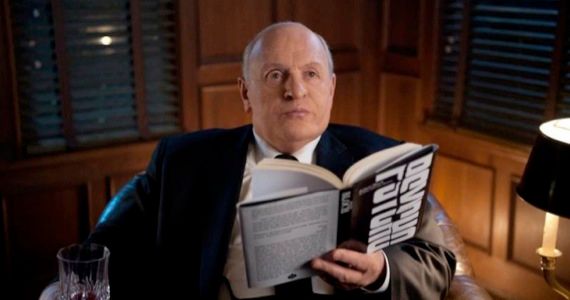
Hitchcock is relatively inoffensive if you consider it the inevitable feel-good runoff of the zeitgeist shift that displaced Citizen Kane with Vertigo on the Sight & Sound list earlier this year. Whatever the reason I don't hate the film like my cohorts mostly do (likely the fact that I've worked as a projectionist showing it the better part of a month; disposable as it is, it plays well with audiences, an achievement that's undeniably infectious), it's still an essentially useless consideration of the infamous director save for the few to whom it will introduce his body of work, otherwise amounting to little more than an adept dramatization of a few pages' worth of IMDb trivia. If you haven't seen Psycho, the making of which is explored herein, the factoids will be mostly lost on you, and despite the intolerably pronounced theatrics of the cast (as the titular Hitch (hold the cock), Anthony Hopkins spends too much time on a synthetic identity crisis to show us how interesting the man really was; he flashes a nasty smirk at the climax I'd liked to have seen more of), inane Psychology 101 visions and snarky historical perspective ("Let alone to flush one!"), I appreciated that the film in question is never itself glimpsed, only the reactions to such. (Yes, that sentence went on too long; final side note: how the hell did they pass up the opportunity to show off the giant shower head?) That's more likely the result of a copyright issue than a creative choice, but then, assuming the latter, even a blind squirrel finds a nut once in a while.
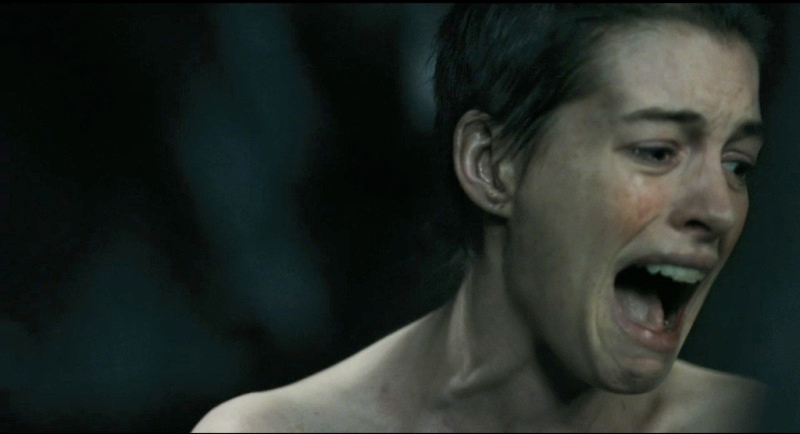
To get lost in the rhapsody of Schönberg/Boublil/Kretzmer's world famous musical, here, I'd have to overlook almost all of Tom Hooper's Les Misérables' visual qualities, at which point we'd no longer be talking about cinema, which is not to suggest that it should qualify as such in the first place. Feeling like one is suffering a migraine that will ultimately lead to blindness isn't my ideal approach to experiencing something attempting uplift and affirmation, and so this lavish production mostly embarrasses itself to these violated eyes. The choice to record the fifty-some songs live on the set, allowing for greater spontaneity and depth of performance, pays off only insofar as the cast is occasionally able to sign and act simultaneously (your mileage will vary depending on how much of the cast seems like they're mistakenly auditioning for Saturday Night Live). Little of that matters given Hooper's astonishingly inept technical handling: not merely fourth-wall breaking and emotionally overbearing, his roving, impatient camerawork feels like a drawn-out implosion of time and space, snippets of footage so randomly and haphazardly assembled as to approach a dadaist fever pitch if there were any sense of purpose behind it. Altogether, I'd doubt if it contained ten minutes of legitimate human emotion, no small achievement for a film with the singing talents of Hugh Jackman in the lead. (I prefer Sally Field's work in Lincoln but Ms. Hathaway arguably deserves and is surely overdue for the Oscar she'll garner for her lightning rod single take solo, about to become the most watched sequence since the Zapruder film.) My pity goes out to the craftsmanship and thesping talent that sank into this trench, and the millions of hours that will be wasted on it. The King's Speech wasn't my cup of tea by any stretch, but 2010's Oscar winning flake seems positively mountainous compared to this whimpering black hole. Fosse wept.
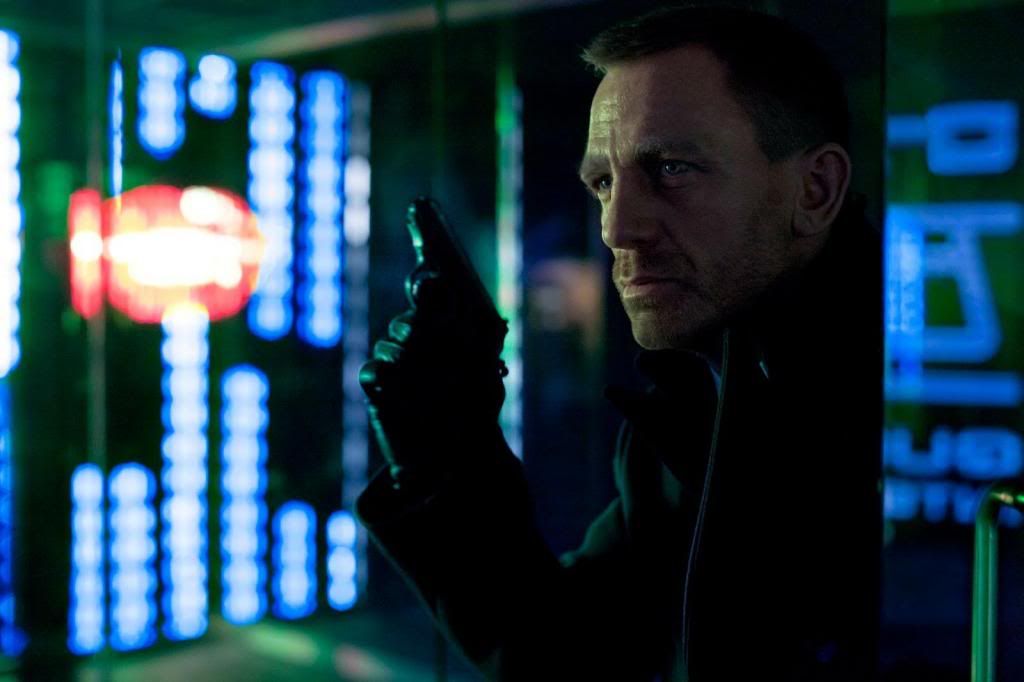
James Bond looks both forward and back in Skyfall, a triumphant return to competent action filmmaking (and then some) after the visually inept/atrociously scripted Quantum of Solace. If I don't quite prefer this fiftieth anniversary's love letter to its predecessors to Casino Royale's furiously self-reflexive genre deconstruction, so be it; these two high water marks have more in common than not, and both evidence the fact that Daniel Craig's line readings are never better than when he's tied to a chair. The stereotypes and trademarks are mostly in place here sans regressive offense (with no proper Bond girl in her way, Judi Dench's M is as prevalent and dynamic as Bond himself), but from the not-unjustified vengeance of Javier Bardem's nightmarish villain (shades, naturally, of Anton Chigurh, and an entrance that might be the single best piece of acting the series has ever witnessed) to the avoidance of field work by an old friend, what propels this grisly chapter is the characters' keen sense of agency (minus one exception that's fitfully disturbing). Bond's self-devouring manhood is both gift and curse, and from the soulful murmurs of Adele's powerhouse theme song to the countless lethal blows 007 deals and nearly suffers, Skyfall especially kicks ass in suggesting that it's far cooler to be tortured and resourceful than brash and destructive. It's also damn beautiful to look at, especially the elevator/skyscraper sequence. As self-aware milestones go, there's few comparisons. A great action film by Sam Mendes – who knew?

I feel like I really need to let you know that while I'm not in a position to tell you that your opinion on Les Miserables is wrong (although I happen to disagree with a lot of it), your review does not make sense. Fosse wept? Please do me a favor and just type in Bob Fosse on google. Not only did Bob Fosse NEVER work on Les Mis in his entire life, he also never worked on anything even remotely similar in genre to Les Mis. Bob Fosse was primarily a choreographer (he won 8 Tonys for his choreography work) that's known for his work on shows like Chicago, Sweet Charity, and Pippin.
ReplyDeleteNeedless to say, it's glaringly obvious that you did absolutely zero research when writing this review and all you seem to have done is take your closed-minded views of theatre and regurgitate them onto a blog. Next time, think through what you post before you post it. Consult the source material, perhaps? And at the very least, don't use some random reference that you think is witty without making sure that it even makes sense, because more often that not, it won't, and you'll just look like a complete fool for writing it.
Different as Fosse and Hooper might have been in the ways you discuss (with enough civility as to catch me off guard; props), the two of them are/were still Oscar-winning filmmakers who took musical material to the screen in ways that were both audacious and championed. All That Jazz is, to these eyes, the greatest musical film ever made and host to some of the best editing the medium has ever seen. (For the sake of brevity here, I'm going to imply that the designation is self-evident: http://youtu.be/bNcl0L7eJUY) Les Miserables '12, quite the opposite. Thank heavens it doesn't have dancing.
ReplyDeleteWhen Bob Fosse made "Cabaret," he completely reimagined it for the screen. He threw out songs and added a song - "Maybe This Time" - and the result was a classic film. Hooper, by contrast, essentially blows out the stage "Les Misérables" into a big gorgeous blockbuster, but it's a straight conversion, such that you can still see the act break. He doesn't account for inconvenient details, for example that on screen, it's not wise to play the same scene over and over (e.g., Javert shows up, Valjean escapes). Nor is it a good idea to have three ballads in a row.
ReplyDeleteAgreed 100% on Flight and Skyfall. Both will likely end up in my Top 5 of the year.
ReplyDeleteI just listened to a Green Day song. It was so bad, Ella Fitzgerald wept.
ReplyDeleteI'm guessing credibility isn't something you really care about anyway, but what Tom Hooper did was cater to the target audience. The people who wanted to see it because they loved the musical would love this movie just as well. The intimate directing was the perfect way to convey all the different emotions and psychological internal conflicts from the characters. It was exactly how to allow all of those beautiful songs to have their full impact. This truly was the greatest movie musical of all time, and it's not even close.
Hi ilovekelly75. Aw, that's nice. Hopefully she doesn't dump you, otherwise you'd have to reinvent your identity to counter it's newfound impracticality. I don't know what kind of proving ground you think you're on, and nor do I care that you're likely either 12 years old or permanently of that mindset. You can disagree without being insolent, and your hyperbolic enthusiasm doesn't make your opinion anything more than just that. It'd sure be nice if someone with class could come along to articulate a dissenting opinion without simply spreading shit around. And now we have you on record. Thanks for stopping by, and be sure to tip your waitresses!
ReplyDeleteThe opening credit sequence was interesting for about a minute, and then it started repeating the same imagery over and over — a tombstone… a tree… a little stone house… oh and there’s more tombstones… more trees. And it pretty much told the whole story of the movie which is painfully obvious upon a second viewing. Casino Royale and Quantum — heck even the 007 video game Bloodstone — had more flashy, interesting intros.
ReplyDeleteAnd I’m tired of all this praise for the cinematography. Quantum was much more artistic and visual, while Casino was shiny and colorful. Skyfall just had a bunch of shots of Bond standing in front of a vista, looking on. “Here’s a shot of Bond standing on a rooftop looking at London! Here’s a shot of Bond standing on a boat looking at Asian dragons! Here’s a shot of Bond taking a leak on the side of a road in Scotland — oh, no, he’s just standing and staring again.” Skyfall was visually messy and not cohesive. I can pick the Casino Royale colors from a box of crayons, same for Quantum. They’re strong and solid. Skyfall is just cat vomit with a few Chinese neon lights.
Thematically the movie was a mess. Bond (sorta) set out to prove he’s still relevant in today’s society. Yet he had to travel to an internet-less, middle of nowhere area to be relevant. In other words, he didn’t prove what he set out to prove. Bond even said he was traveling “to the past” aka wilderness Scotland to win. That’s a mixed message. And once there, the ending muddies the message further. Let me ask one question to prove this point: Who killed M?
Exactly. We have no idea who killed M. Some faceless, nameless goon shot a bullet that happened to hit M at some point. We don’t even learn about it until after the fact. I guess you could argue that Javier Bardem killed her since he hired the goon, but if that’s the case, then why not just let him shoot her? It would parallel the beginning where M let Bond get shot. That would be a thing of beauty, story-wise. Bottom line, Bond doesn’t save the day, M dies, and there’s no real growth for the characters. Bond, always the hero, is not a hero here. Still, the message is unclear. Should we conclude that M is to blame for her own death for lying about Bond’s test scores, allowing him to go out into the field unprepared? Is this supposed to be commentary on bureaucratic incompetence and a form of nepotism? There’s just no simple interpretation (eg. “Bad guys lose, good guy turns hero”), nor is there any clear, deeper thematic message. It just left me bored and disinterested. And that’s sad considering how good Craig’s previous two outings were.
The only possible message is that Bond’s character is getting old, unable to compete in today’s world, and is somewhat irrelevant unless the conditions favor him, and even still he’ll get his colleagues killed. That’s some pretty crappy commentary on a celebrated character, and it suggests Skyfall’s creators really have some hostility towards the iconic 007.